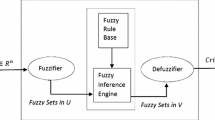Abstract
In this paper, we present a new hybrid method for solving fuzzy optimal control problems (FOCP). This hybrid method consists of a polynomial and an improved multi-layer perceptron (IMLP) network neural network. An improved neural network is a two-layer neural network. The first layer consists of inputs, weights, and six non-linear sigmoid transfer functions per α-cut and every training point. The second layer, which is the same output layer, includes the weights of the output layer and the neural network outputs, and six linear transfer functions per α-cut and each educational point. Artificial Neural Network training is based on the optimization technique on the target function. This objective function is the error function, and is equal to the sum of the squared errors that are based on the Pontryagin minimization principle.
Access this chapter
Tax calculation will be finalised at checkout
Purchases are for personal use only
Similar content being viewed by others
References
Berkani, S., Manseur, F., Maidi, A.: Optimal control based on the variational iteration method. Comput. Math. Appl. 64, 604–610 (2012)
Bede, B., Gal, S.G.: Generalizations of the differentiability of fuzzy-number-valued functions with applications to fuzzy differential equations. Fuzzy Sets Syst. 151, 581–599 (2005)
Clever, D., Lang, J., Ulbrich, S., Ziems, J.C.: Combination of an adaptive multilevel SQP method and a space-time adaptive PDAE solver for optimal control problems. Procedia Comput. Sci. 1, 1435–1443 (2010)
Cheng, T., Sun, H., Qu, Z., Lewis, F.L.: Neural network solution for suboptimal control of non-holonomic chained form system. Trans. Inst. Measurement Control 31(6), 475–494 (2009)
Cheng, T., Lewis, F.L.: Neural network solution for finite horizon H-infinity constrained optimal control of nonlinear systems. J. Control Theory Appl. 5(1), 1–11 (2007)
Effati, S., Pakdaman, M.: Optimal control problem via neural networks. Neural Comput. Appl. 23, 2093–2100 (2012)
Ezadi, S., Parandin, N., Homashi, A.G.: Numerical solution of fuzzy differential equations based on semi-taylor by using neural network. J. Basic Appl. Sci. Res. 3(1s), 477–482 (2013)
Farhadinia, B.: Pontryagin’s minimum principle for fuzzy optimal control problems. Iran. J. Fuzzy Syst. 11, 27–43 (2014)
Farahi, M.H., Keshtegar, M., Najariyan, M.: Fuzzy optimal control of a poisoning-pest model by using -cuts. J. Eng. Res. Technol. 1(3), 79–82 (2014)
Garg, D., Patterson, M., Hagera, W.W., Raoa, A.V., Bensonb, D.A., Huntington, G.T.: A unified framework for the numerical solution of optimal control problems using pseudo-spectral methods. Automatica 46, 1843–1851 (2010)
Gerdts, M.: A non-smooth Newton’s method for control-state constrained optimal control problems. Math. Comput. Simul. 79, 925–936 (2008)
Hornick, K., Stinchcombe, M., White, H.: Multilayer feedforward networks are universal approximators. Neural Netw. 2, 359–366 (1989)
Hilscher, R.S., Zeidan, V.: Hamilton-Jacobi theory over time scales and applications to linear-quadratic problems. Nonlinear Anal. 75, 932–950 (2012)
Wu, H.-C.: Duality theory in fuzzy optimization problems. Fuzzy Optim. Decis. Making 3, 345–365 (2004)
Krabs, W., Pickl, S.: An optimal control problem in cancer chemotherapy. Appl. Math. Comput. 217, 1117–1124 (2010)
Kirk, D.E.: Optimal Control Theory—An Introduction. Dover Publications, Mineola (2004)
Ku, C.C., Huang, P.H., Chang, W.J.: Passive fuzzy controller design for nonlinear systems with multiplicative noises. J. Franklin Institute 347, 732–750 (2010)
Kwun, Y.C., Kim, J.S., Park, M.J., Park, J.H.: Nonlocal controllability for the semi linear fuzzy integro differential equations in n-dimensional fuzzy vector space. Advances in Difference Equations (2009)
Liu, C., Nocedal, J.: On the limited memory BFGS method for large scale optimization. Math. Program. 45(3), 503–528 (1989)
Lewis, F., Syrmos, V.L. (eds.): Optimal Control. Springer, Cham (2016)
Luenberger, D.G. (ed.): Linear and Nonlinear Programming, 2nd edn. Addison Wesley, Boston (2008)
Modares, H., Naghibi Sistani, M.B.: Solving nonlinear optimal control problems using a hybrid IPSOSQP algorithm. Eng. Appl. Artif. Intell. 24, 476–484 (2011)
Najariyan, M., Farahi, M.H.: Optimal control of fuzzy linear controlled system with fuzzy initial conditions. Iran. J. Fuzzy Syst. 10(3), 21–35 (2013)
Pontryagin, L.S., Boltyanskii, V.G., Gamkrelidze, R.V., Mishchenko, E.F.: The mathematical theory of optimal processes, translated from the Russian by K. N. Trirogoff; edited by L. W. Neustadt. Interscience Publishers John Wiley & Sons, Inc., New York (1962)
Pinch, R.: Optimal Control and the Calculus of Variations. Oxford Science Publications, Oxford University Press, New York (1993)
Phu, N.D., Tung, T.T.: Existence of solutions of fuzzy control differential equations. J. Sci. Technol. Dev. 10, 5–12 (2007)
Roman, F., Barros, L., Bassanezi, R.: A note on the Zadeh’s extensions, Fuzzy sets on Banach spaces. Inform. Sci. 144, 227–247 (2002)
Ross, I.M.: A Primer on Pontryagin’s Principle in Optimal Control. Collegiate Publishers (2009). ISBN 978-0-9843571-0-9
Nik, H.S., Effati, S., Shirazian, M.: An approximate-analytical solution for the Hamilton–Jacobi–Bellman equation via homotopy perturbation method. Appl. Math. Model. 36(11), 5614–5623 (2012)
Takagi, T., Sugeno, M.: Fuzzy identification of systems and its applications to modeling and control. IEEE Trans. SMC 15, 116–132 (1985)
Yang, D., Cai, K.Y.: Finite-time quantized guaranteed cost fuzzy control for continuous- time nonlinear systems. Expert Syst. Appl. (2010). https://doi.org/10.1016/j.eswa.03.024
Zadeh, L.A.: Fuzzy sets. Inf. Control 8, 338–353 (1965)
Zimmermann, H.J.: Fuzzy Set Theory and Its Applications. Kluwer Academic, Boston (1991)
Author information
Authors and Affiliations
Corresponding author
Editor information
Editors and Affiliations
Rights and permissions
Copyright information
© 2021 The Author(s), under exclusive license to Springer Nature Switzerland AG
About this paper
Cite this paper
Askari, S., Abbasbandy, S. (2021). A New Combination Method for Fuzzy Optimal Control. In: Allahviranloo, T., Salahshour, S., Arica, N. (eds) Progress in Intelligent Decision Science. IDS 2020. Advances in Intelligent Systems and Computing, vol 1301. Springer, Cham. https://doi.org/10.1007/978-3-030-66501-2_10
Download citation
DOI: https://doi.org/10.1007/978-3-030-66501-2_10
Published:
Publisher Name: Springer, Cham
Print ISBN: 978-3-030-66500-5
Online ISBN: 978-3-030-66501-2
eBook Packages: Intelligent Technologies and RoboticsIntelligent Technologies and Robotics (R0)




